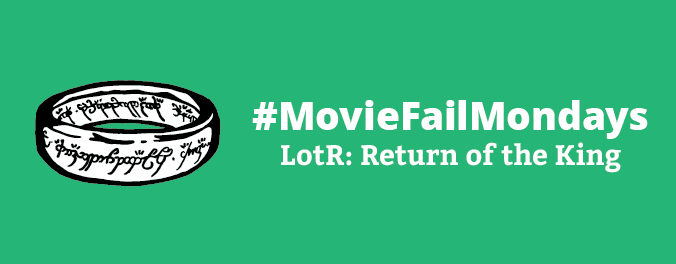#MovieFailMondays: Return of the King
Every week we bring you a new movie that teaches us about a logical fallacy you’ll find on the LSAT. Who says Netflix can’t help you study?

Wait a minute, Matt – don’t tell me there’s a logical fallacy in Return of the King!
I can almost promise you that there are a few plot holes in J.R.R. Jackson’s epic trilogy (“They should have just called the eagles from the beginning!”), but that’s not what we’re going to discuss today.
Instead, we’re going to look at the climactic scene, where (#SPOILERALERT) the dwindled Fellowship brings the One Ring to Mt. Doom after the bloody Battle of Pelennor Fields. And yes, if you have no idea what we’re talking about, you’re much cooler than we are.
Peter Tolkein’s epic trilogy tells the tale of plucky young Frodo’s epic quest to destroy the fabled ring that brought corruption into the world. On their way to the Dark Lord Sauron’s fortress of solitude, Mt. Doom, the Fellowship that grows up around the brave-yet-diminutive hobbit encounters a variety of fantasy tropes, from undead kings to evil wizards to living trees to the original elves. Though, to be fair, they weren’t tropes until P.R.R. Tolkson’s writing made them so.
A hidden king, a grey wizard, and a Sean Bean are only some of the characters helping Frodo along the way. Sting also helps out, but it’s not the Sting you’re thinking of. And all the way, the creepy Gollum stalks the group, spawning catchphrases all along the way.
Thousands of on-screen hours later, at the foot of Mt. Doom, Frodo needed a distraction. And while Rudy might be good on the field of Notre Dame, he was more or less useless on the fields of Pelennor.
As the realms of man fought against Sauron’s forces, the dreaded Witch King landed among the heroic forces. An unstoppable killing machine, he laid waste to legions of human combatants. Wielding The Sword of Terror and weapons-grade halitosis, the fallen king felt protected by the prophecy that “not by the hand of man” shall fall Macbeth. I mean, the Witch King.
And thus yet another character’s life was cut short by an equivocation fallacy. For what the Witch King didn’t realize was that when Glorfindel made that prophecy, he was using “man” literally. Eowyn—niece of Theoden—ripped off her helm and fell the monster.

The LSAT pulls this trick all the time. Sometimes, it uses a word in two different senses (as we see here – “man” meaning both a male and the human race). Others, it will use two closely related terms as if they mean the same thing. In either case, the LSAT is equivocating, and this fallacy is one of the most common on the exam.
Look out for arguments that shift the definition of a given word, or bring up a new term in the conclusion, and you won’t be slain by a shieldmaiden of Rohan. By which we mean get the question wrong. Yes, our metaphors are getting increasingly strained. We can’t write as well as PeteR.R. Marteinson.
 Matt Shinners is a Manhattan Prep instructor based in New York City. After receiving a science degree from Boston College, Matt scored a 180 on his LSAT and enrolled in Harvard Law School. There’s nothing that makes him happier than seeing his students receive the scores they want to get into the schools of their choice. Check out Matt’s upcoming LSAT courses here!
Matt Shinners is a Manhattan Prep instructor based in New York City. After receiving a science degree from Boston College, Matt scored a 180 on his LSAT and enrolled in Harvard Law School. There’s nothing that makes him happier than seeing his students receive the scores they want to get into the schools of their choice. Check out Matt’s upcoming LSAT courses here!